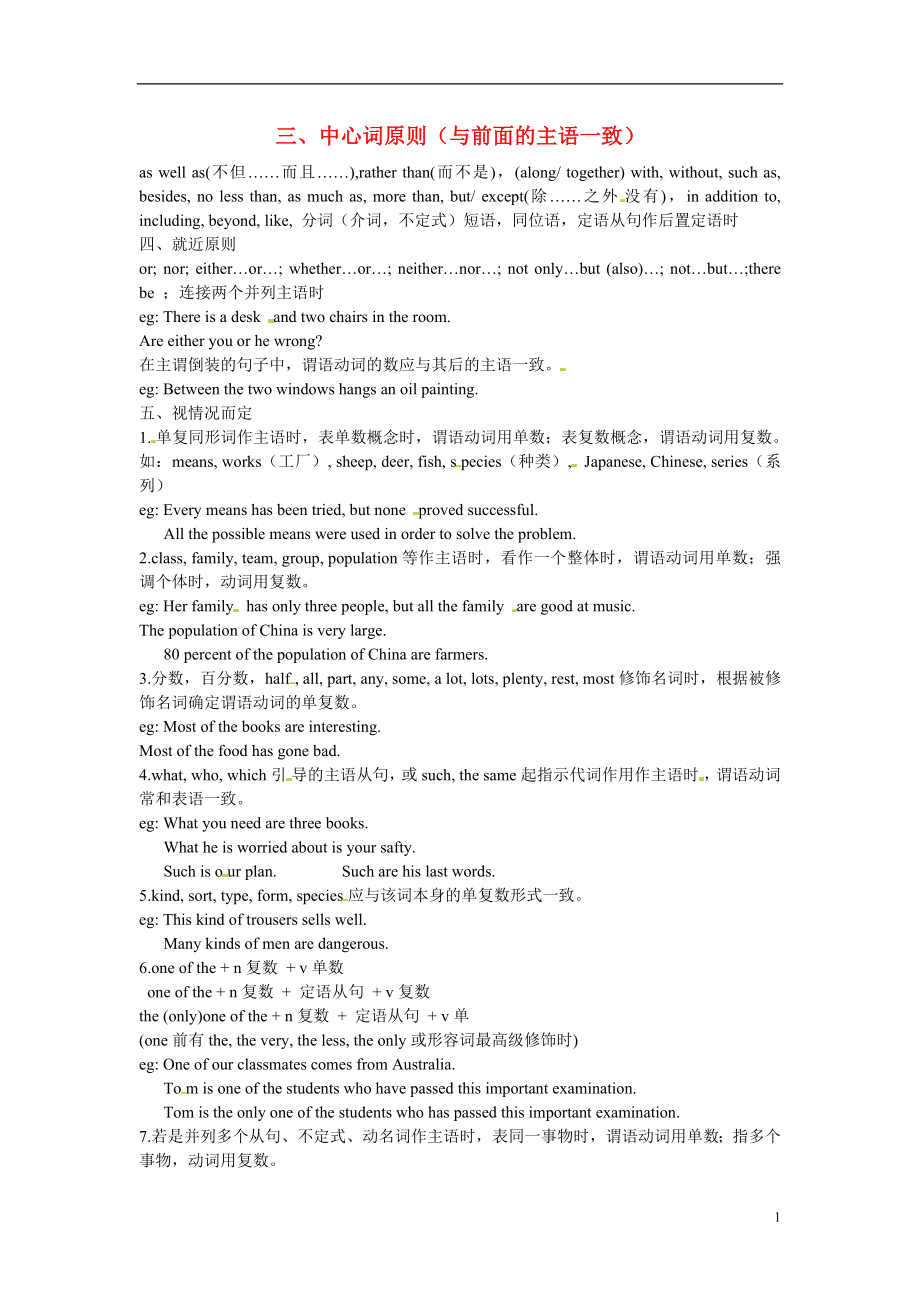《河北省撫寧縣第六中學(xué)2013-2014學(xué)年高二英語(yǔ) 主謂一致(二)學(xué)案》由會(huì)員分享����,可在線閱讀,更多相關(guān)《河北省撫寧縣第六中學(xué)2013-2014學(xué)年高二英語(yǔ) 主謂一致(二)學(xué)案(2頁(yè)珍藏版)》請(qǐng)?jiān)谘b配圖網(wǎng)上搜索���。
1�、
三、中心詞原則(與前面的主語(yǔ)一致)
as well as(不但……而且……),rather than(而不是)�����,(along/ together) with, without, such as, besides, no less than, as much as, more than, but/ except(除……之外沒(méi)有)�,in addition to, including, beyond, like, 分詞(介詞,不定式)短語(yǔ)����,同位語(yǔ)�����,定語(yǔ)從句作后置定語(yǔ)時(shí)
四、就近原則
or; nor; either…or…; whether…or…; neither…nor…; not on
2�����、ly…but (also)…; not…but…;there be �;連接兩個(gè)并列主語(yǔ)時(shí)
eg: There is a desk and two chairs in the room.
Are either you or he wrong?
在主謂倒裝的句子中,謂語(yǔ)動(dòng)詞的數(shù)應(yīng)與其后的主語(yǔ)一致���。
eg: Between the two windows hangs an oil painting.
五���、視情況而定
1.單復(fù)同形詞作主語(yǔ)時(shí)���,表單數(shù)概念時(shí),謂語(yǔ)動(dòng)詞用單數(shù)�����;表復(fù)數(shù)概念���,謂語(yǔ)動(dòng)詞用復(fù)數(shù)�。如:means, works(工廠), sheep, deer, fish, species
3��、(種類(lèi)), Japanese, Chinese, series(系列)
eg: Every means has been tried, but none proved successful.
All the possible means were used in order to solve the problem.
2.class, family, team, group, population等作主語(yǔ)時(shí)�,看作一個(gè)整體時(shí),謂語(yǔ)動(dòng)詞用單數(shù)�;強(qiáng)調(diào)個(gè)體時(shí),動(dòng)詞用復(fù)數(shù)�����。
eg: Her family has only three people, but all the family a
4�、re good at music.
The population of China is very large.
80 percent of the population of China are farmers.
3.分?jǐn)?shù)�,百分?jǐn)?shù),half, all, part, any, some, a lot, lots, plenty, rest, most修飾名詞時(shí),根據(jù)被修飾名詞確定謂語(yǔ)動(dòng)詞的單復(fù)數(shù)��。
eg: Most of the books are interesting.
Most of the food has gone bad.
4.what, who, which引導(dǎo)
5�、的主語(yǔ)從句,或such, the same起指示代詞作用作主語(yǔ)時(shí)����,謂語(yǔ)動(dòng)詞常和表語(yǔ)一致。
eg: What you need are three books.
What he is worried about is your safty.
Such is our plan. Such are his last words.
5.kind, sort, type, form, species應(yīng)與該詞本身的單復(fù)數(shù)形式一致�。
eg: This kind of trousers sells well.
Many kinds of men are danger
6、ous.
6.one of the + n復(fù)數(shù) + v單數(shù)
one of the + n復(fù)數(shù) + 定語(yǔ)從句 + v復(fù)數(shù)
the (only)one of the + n復(fù)數(shù) + 定語(yǔ)從句 + v單
(one前有the, the very, the less, the only或形容詞最高級(jí)修飾時(shí))
eg: One of our classmates comes from Australia.
Tom is one of the students who have passed this important examination.
Tom is the only one of the students who has passed this important examination.
7.若是并列多個(gè)從句����、不定式、動(dòng)名詞作主語(yǔ)時(shí)�,表同一事物時(shí),謂語(yǔ)動(dòng)詞用單數(shù)����;指多個(gè)事物,動(dòng)詞用復(fù)數(shù)���。
eg: Swimming in summer and skating in winter are my greatest pleasure.
8.the number of + n + v單數(shù) “……的數(shù)量”
a number of + n復(fù)數(shù) + v復(fù)數(shù) “許多��,大量”
2
 河北省撫寧縣第六中學(xué)2013-2014學(xué)年高二英語(yǔ) 主謂一致(二)學(xué)案
河北省撫寧縣第六中學(xué)2013-2014學(xué)年高二英語(yǔ) 主謂一致(二)學(xué)案

